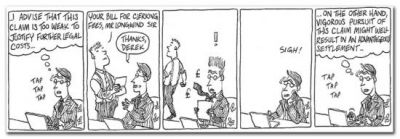Lord Justice Jackson’s recent lecture on Assessment of Costs in the Brave New World reveals a number of important forthcoming amendments to the CPR and Costs Practice Direction.
One of the big changes it to scrap the current CPR 47.18 and 47.19, concerning liability for detailed assessment costs, and substitute these with:
“47.18
(1) The general rules about costs contained in Parts 36, 43 and 44 apply to the costs of detailed assessment proceedings, as if “claimant” means receiving party and “defendant” means paying party.
(2) The court will summarily assess the costs of detailed assessment proceedings at the conclusion of those proceedings, unless otherwise ordered.
47.19
Unless the court otherwise orders, interest on the costs of detailed assessment proceedings shall run from the date of the default, interim or final costs certificate, as the case may be.”
I’m not entirely sure what to make of this (it isn’t clear as to what this will actually mean).
The existing express presumption that the receiving party gets the costs of assessment goes. You will then have to look at CPR 44.3 as the starting point:
“(2) If the court decides to make an order about costs –
(a) the general rule is that the unsuccessful party will be ordered to pay the costs of the successful party; but
(b) the court may make a different order.”
What does this mean it relation to detailed assessment costs? Is the “successful” party the party who won the substantive claim? Or, is the “successful” party the party who succeeds in relation to the detailed assessment hearing, which is the subject of the order being made? How do you define success if neither party has made a successful offer? If a paying party reduces a bill by 40% are they the “successful” or the “unsuccessful” party? Satellite litigation round one.
Even if we accept that the intention of the rule is that the receiving party is to be treated as the “successful” part, having won the substantive claim, where do we go from there other than having a presumption?
The current Part 47.18 creates a presumption in favour of the receiving party but then says at Part 47.18(2):
“In deciding whether to make some other order, the court must have regard to all the circumstances, including –
(a) the conduct of all the parties;
(b) the amount, if any, by which the bill of costs has been reduced; and
(c) whether it was reasonable for a party to claim the costs of a particular item or to dispute that item.”
Is this very different from Part 44.3, which will now govern matters:
“(4) In deciding what order (if any) to make about costs, the court must have regard to all the circumstances, including –
(a) the conduct of all the parties;
(b) whether a party has succeeded on part of his case, even if he has not been wholly successful; and
(c) any payment into court or admissible offer to settle made by a party which is drawn to the court’s attention, and which is not an offer to which costs consequences under Part 36 apply.
(5) The conduct of the parties includes –
(a) conduct before, as well as during, the proceedings and in particular the extent to which the parties followed the Practice Direction (Pre-Action Conduct) or any relevant pre-action protocol;
(b) whether it was reasonable for a party to raise, pursue or contest a particular allegation or issue;
(c) the manner in which a party has pursued or defended his case or a particular allegation or issue; and
(d) whether a claimant who has succeeded in his claim, in whole or in part, exaggerated his claim.”
Both rules give a court the discretion to depart from the starting point presumption where, for example, a bill is reduced on assessment by 50% or where unreasonable items of costs have been claimed.
The removal of the current Part 47.19 rule and the substitution of Part 36 to deal with costs offers will create more certainty where a party succeeds on their own offer (a successful Part 47.19 is currently just a factor for the court to consider).
The ability to make Part 36 offers will create a considerable incentive to receiving parties to make realistic Part 36 offers at an early stage if they can recover interest at 10% above base rate on their costs (assuming that is how this will operate) where they succeed at detailed assessment on their offer. Although, if interest currently runs at 8% (Court of Appeal shortly to clarify) some may take the view that they would rather drag out settlement and get 8% for a longer period than make a sensible early offer and risk having the matter settle early on the outside chance they might have recovered 10% plus base rate at assessment.
Advising on where to pitch offers is going to become an increasingly sophisticated task.

